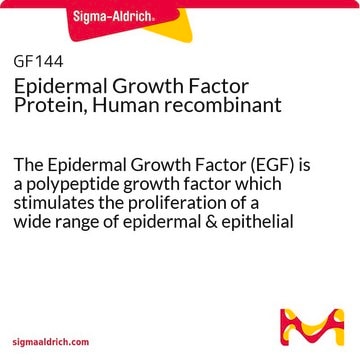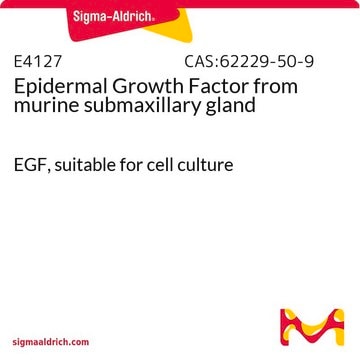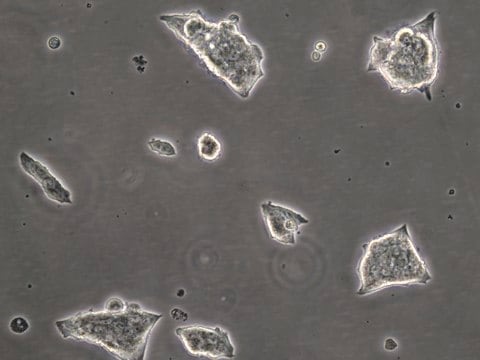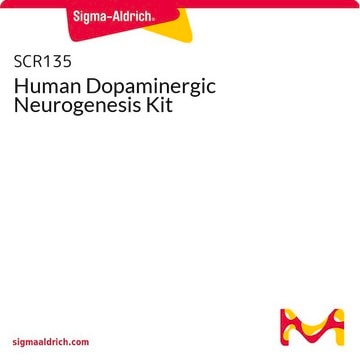SCR128
Dopaminergic Differentiation Growth Factor Sampler
This Dopaminergic Differentiation Growth Factor Sampler contains five validated growth factors used to induce differentiation of human pluripotent Embryonic stem (ES) & induced pluripotent Stem (iPS) cells to dopaminergic neurons.
Sign Into View Organizational & Contract Pricing
All Photos(2)
About This Item
UNSPSC Code:
12352202
eCl@ss:
32160405
NACRES:
NA.77
Recommended Products
Quality Level
Assay
>98% (SDS-PAGE and HPLC)
impurities
<0.1 ng/μg endotoxin (1EU/μg)
shipped in
dry ice
Related Categories
General description
EMD Millipore’s Dopaminergic Differentiation Growth Factor Sampler contains a collection of five validated growth factors that are routinely used to induce differentiation of human pluripotent ES/iPS cells to dopaminergic neurons along with a reliable high affinity antibody marker, anti-tyrosine hydrodylase, to aid in quantifying the percentage yields from differentiation experiments.
Product Source: E. coli.
Specificity
Cross Reactivty
None
None
Application
Research Category
Stem Cell Research
Stem Cell Research
Research Sub Category
Growth Factors & Receptors
Growth Factors & Receptors
This Dopaminergic Differentiation Growth Factor Sampler contains five validated growth factors used to induce differentiation of human pluripotent Embryonic stem (ES) & induced pluripotent Stem (iPS) cells to dopaminergic neurons.
Components
1. Sonic HedgeHog (Shh), Human Recombinant (Part No. GF174-5UG): Two 5 μg vials. Lyophilized powder. Store at -20°C.
2. Fibroblast Growth Factor-8 (FGF-8), Human Recombinant (Part No. GF110-5UG): One 5 μg vial. Lyophilized powder. Store at -20°C.
3. Brain Derived Neurotrophic Factor (BDNF), Human Recombinant (Part No. GF029-2UG): One 2 μg vial. Lyophilized powder. Store at -20°C.
4. Glial Derived Neurotrophic Factor (GDNF), Human Recombinant (Part No. GF030-2UG): One 2 μg vial. Lyophilized powder. Store at -20°C.
5. Transforming Growth Factor β-III (TGF-β-III), Human Recombinant (Part No. GF176-2UG): One 2 μg vial. Lyophilized powder. Store at -20°C.
6. Anti-Tyrosine Hydroxylase antibody, rabbit polyclonal (Part No. AB152-20): One 20 μL vial. Store at -20°C.
2. Fibroblast Growth Factor-8 (FGF-8), Human Recombinant (Part No. GF110-5UG): One 5 μg vial. Lyophilized powder. Store at -20°C.
3. Brain Derived Neurotrophic Factor (BDNF), Human Recombinant (Part No. GF029-2UG): One 2 μg vial. Lyophilized powder. Store at -20°C.
4. Glial Derived Neurotrophic Factor (GDNF), Human Recombinant (Part No. GF030-2UG): One 2 μg vial. Lyophilized powder. Store at -20°C.
5. Transforming Growth Factor β-III (TGF-β-III), Human Recombinant (Part No. GF176-2UG): One 2 μg vial. Lyophilized powder. Store at -20°C.
6. Anti-Tyrosine Hydroxylase antibody, rabbit polyclonal (Part No. AB152-20): One 20 μL vial. Store at -20°C.
Quality
Using the growth factors supplied in this kit a 3-5 fold increase of dopaminergic differention (up to 50-70% TH+ cells) was routinely produced using HES/hips cell derived neural progenitor cells vs. spontaneous neuronal differentiation.
Storage and Stability
Store at -20°C for up to 6 months from date of receipt.
Disclaimer
Unless otherwise stated in our catalog or other company documentation accompanying the product(s), our products are intended for research use only and are not to be used for any other purpose, which includes but is not limited to, unauthorized commercial uses, in vitro diagnostic uses, ex vivo or in vivo therapeutic uses or any type of consumption or application to humans or animals.
Signal Word
Warning
Hazard Statements
Precautionary Statements
Hazard Classifications
Eye Irrit. 2
Storage Class Code
10 - Combustible liquids
Certificates of Analysis (COA)
Search for Certificates of Analysis (COA) by entering the products Lot/Batch Number. Lot and Batch Numbers can be found on a product’s label following the words ‘Lot’ or ‘Batch’.
Already Own This Product?
Find documentation for the products that you have recently purchased in the Document Library.
Articles
Human iPSC neural differentiation media and protocols used to generate neural stem cells, neurons and glial cell types.
Our team of scientists has experience in all areas of research including Life Science, Material Science, Chemical Synthesis, Chromatography, Analytical and many others.
Contact Technical Service








